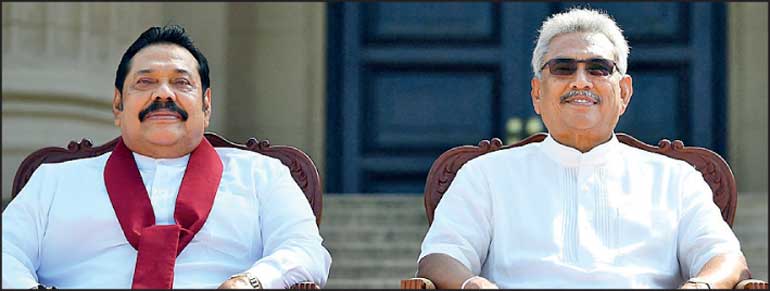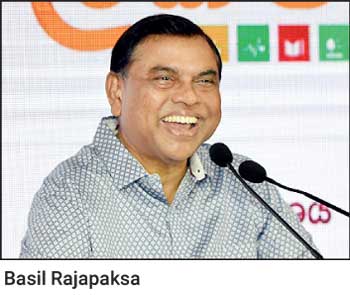Wednesday Feb 18, 2026
Wednesday Feb 18, 2026
Wednesday, 15 November 2023 01:42 - - {{hitsCtrl.values.hits}}

Former President Mahinda Rajapaksa (left) and Gotabaya Rajapaksa
 In a historic ruling, the Supreme Court yesterday determined that ex-President Gotabaya Rajapaksa, along with former Finance Ministers Mahinda Rajapaksa and Basil Rajapaksa, bear responsibility for Sri Lanka’s severe economic crisis and had thereby violated the fundamental rights of the people by mismanaging the economy between 2019 and 2022. The apex court found that the 13 respondents, which also included Central Bank Governors Ajith Nivard Cabraal, Prof. W.D. Lakshman, former Secretary to the Ministry of Finance S.R. Attygalle, former Secretary to the President P.B. Jayasundara and Members of the Monetary Board of the Central Bank of Sri Lanka had violated public trust and breached Article 12 (1) of the Constitution, in their administration of the economy, leading to the economic crisis in the country.
In a historic ruling, the Supreme Court yesterday determined that ex-President Gotabaya Rajapaksa, along with former Finance Ministers Mahinda Rajapaksa and Basil Rajapaksa, bear responsibility for Sri Lanka’s severe economic crisis and had thereby violated the fundamental rights of the people by mismanaging the economy between 2019 and 2022. The apex court found that the 13 respondents, which also included Central Bank Governors Ajith Nivard Cabraal, Prof. W.D. Lakshman, former Secretary to the Ministry of Finance S.R. Attygalle, former Secretary to the President P.B. Jayasundara and Members of the Monetary Board of the Central Bank of Sri Lanka had violated public trust and breached Article 12 (1) of the Constitution, in their administration of the economy, leading to the economic crisis in the country.
The court noted that the conduct of the respondents had directly contributed to the results that led to the crisis situation and they ought to have known and should have taken actions to resolve matters that negatively impacted the economy and not further aggravate the impact and are responsible to act in the best interest of the country.
It also stressed that public officers have a responsibility to discharge their duties in the best interest of the public and respondents are bestowed high power to uphold public trust and are duty-bound to discharge duties according to directives of the Constitution.
Delivering its ruling, the Supreme Court noted that the respondents cannot shirk responsibility by merely stating that the decisions they took were policy decisions and it was within the full power of the respondents to prevent such calamity as they had full knowledge.
The court also said that it is clear they did not act and take all measures to remedy the situation in the public interest and therefore the cumulative actions and inactions by Respondents led to the debacle. It also ruled that the actions, omissions and conduct of respondents had in fact contributed to the economic crisis.
The ruling was delivered by a five-member Supreme Court bench led by Chief Justice Jayantha Jayasuriya. While Chief Justice Jayantha Jayasuriya and Justices Buwaneka Aluwihare, Vijith Malalgoda, Murdhu Fernando collectively issued the majority verdict, Justice Priyantha Jayawardena dissented.
The Supreme Court delivered the ruling after considering two fundamental rights petitions filed by Samagi Jana Balawegaya (SJB) member Prof. Mahim Mendis, former President of the Ceylon Chamber of Commerce Chandra Jayaratne, Julian Bowling, Jehan CanagaRetna, Transparency International Sri Lanka (TISL) and several others.
The fundamental rights petitions were brought forward by the petitioners against the lack of transparency and accountability in high-level decision-making, which resulted in an economic crisis in Sri Lanka.
The petitioners had maintained that the reduction in government revenue due to unauthorised tax concessions in 2019 amounting to Rs. 681 billion and the failure to rectify and retract the granted tax breaks had led to the economic downturn.
They also pointed out that the situation was exacerbated due to the delay in seeking assistance from the International Monetary Fund and inaction in making timely decisions regarding the valuation of the national currency among other causes that had led to the economic downturn. The petitioners had requested the court to order an investigation against those accountable for the ongoing economic crisis.